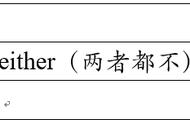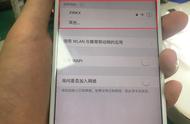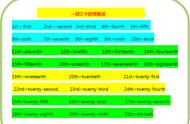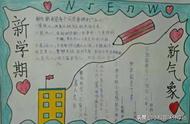不定代词是不指明代替任何特定名词或形容词的代词。常见的不定代词有以下两类:
A. 限定性代词:
all, each, both, either, neither, one, none, little, few, many, much, other, another, some, any等.
B. 复合性代词,即由some, any, every, no 与body,one, thing构成的十二个合成词:
somebody, anybody, everybody, nobody
someone, anyone, everyone, no one
something, anything, everything, nothing

★No. 1: both, either,neither
1. 意思:both两者都,neither两者都不,either两者中任何一个
2. 作主语:both后面的谓语动词用复数。neither, either后面的谓语动词用单数。
1) Both of them are here today.
2) Neither of us is a doctor.
3) Either is OK.
3. 修饰名词:both后面接复数名词,either 与neither后面接单数名词。
1) Both brothers are dead.
2) You may take either apple.
3) Neither story is true.
4. both 作同位语:放在be,助动词或情态动词后。
1) They are both in good health.
2) They will both go there.
5. either 可作副词:用于否定句,表示 “也”
I don't want to go there, either.
6. neither 表示“也不”:用在倒装的结构中:
I don't like to play football. Neither does he. 我不喜欢踢足球,他也不喜欢。
She hasn't got a bike. Neither have I. 他没自行车,我也没有。
7. 短语: both …and, either…or, neither…nor
1) both …and ……和……两者都
Both Zhang and Wang are good students.
2) either…or 或者……或者
Either you or he is right.
注意:谓语动词的变化按“就近原则”, 如这句中的“is" 与”he“邻近,所以不用"are”。
3) neither…nor 既不……也不
Neither he nor I am a scientist.
注意:谓语动词的变化按“就近原则”,这句中的”am"与“I"邻近,所以不用"is"。
★No. 2: one, it, that
1. one 用来代替前文的单数名词,指同类中的一个。
1) I haven't got a ball pen. I'll have to buy one.
这里的one代指 a ball pen。
2) Which book is yours? The one on the desk.
这里的one代指book。
2. it代指上文提到的单数名词,指同一个物。
That bike is very beautiful. I want to buy it.
这里的it指that bike。
3. that 代替上文提到的单数名词,相当于the 名词,用于对比。
The weather in Kunming is much warmer than that in Beijing.
这里的that代指the weather。
4. 复数:one—ones, that—those
1) Which books are yours? The ones on the desk.
ones代指复数名词books。
2) The pictures on the wall are much more beautiful than those on the desk.
those代指上文提到的the pictures.
★No.3: other, another, the other
1. other 意思是“另外”,后面接可数名词复数
He studies English, math and some other subjects.
2. the other 指两者中的另一个
One of the twins likes apples, the other likes oranges.
3. others 和 the others 表复数, 后面不接名词
Some students are dancing, others are singing.
Five of my classmates went to the cinema, but the others went hiking yesterday.
4. another 表三者及以上中的“再一,另一” 个,后接单数名词
Have another cup of coffee, please.
5. another后还可以接“数词 名词复数”
She could have to stay here for another ten days.
★No.4: little, a little, few, a few
1. little 与 a little 修饰不可数名词,前者表示否定,意思是“几乎没有”,后者表示肯定,意思是“有一点儿”。
1) In this way they can make the trip with just a little money. (带一点儿钱)
2)There is little left, is there? (几乎什么也没有了)
2. few, a few 修饰可数名词复数,前者表示否定,意思是“几乎没有”,后者表示肯定,意思是“有几个”。
1) A few of us speak English well.
2) There were few eggs in the fridge, so he went to the supermarket and bought some.
★No.5: some, any
some 和any都可以修饰可数名词和不可数名词
I have some books.(修饰可数名词)
I have some bread.(修饰不可数名词)
2. some用于肯定句,any用于否定句和疑问句。
I have some questions to ask you.(肯定句)
Do you have any questions?(疑问句)
I don't have any questions.(否定句)
3. 表请求、提建议和征求意见的疑问句,用some.:
Could you lend me some money?(你能借给我一些钱吗?)
4. 条件句中用any。
Put up your hands if you have any questions.(如果你有问题,请举手)
5. any 表“任何一个”的意思时,用肯定句
Any of you can ask me some questions.(你们中的任何人都可以问我一些问题)
★No.6: no one, none, no
1. none :三者及三者以上中一个也没有,既可指人,也可指物
None of the students wants to go there.(指人)
None of the books is mine.(指物)
2. none 既可代替不可数名词,也可代替可数名词时
None of us is from Beijing. (我们中没有人是北京来的)
None of the money is mine.(这些钱没有一点儿是我的)
3. No one :没有人
No one wants to go there.(没人想去那儿)
4. None 常与of连用,no one后面不能接of
I know none of them.
5. None作主语,谓语动词用单数或复数
None of them is going there.(单数)
None of them are going there.(复数)
6. No不是不定代词,只是一个形容词,后面必须接名词
No of them wants to go there. (错误)
He found no book on the desk.(正确)
★No.7: each, every
1. each表两者以上中的每一个,every表三者以上中每一个
Each of my parents is going there.(父母亲是两个人)
Every/ Each student in our class is going there.(学生是两个或两个以上,当然也就包含三者)
2. each后可接名词,也可不接,但every后必须接名词
Each of the students will go there. (后面没有名词,不用every)
3. every 后可接时间名词
every other day 每隔一天
every five days 每五天
★No. 8: many, much
1. many 修饰可数名词复数,主要用于否定句和疑问句。
Did you see many people there?
2. much 修饰不可数名词,主要用于否定句和疑问句。
We don't have much time.
3. 肯定句中一般用 a lot of, lots of, plenty of 等代替many和much。
There are a lot of trees on both sides of the street.
4. many, much用于肯定句的情况:
1)作主语时: Many of us left early.
2)修饰主语时: Much work has been done.
3)前面有 how, too, as, so, a good, a great 等时:
You've given me too much.
Take as many (much) as you want.
I asked her a great many questions.
★No.9: 复合性不定代词的性质
1.后面不接of
Nobody of them wants to go there. (错误,可改成None)
2. 形容词作定语时,放在后面
I have something important to tell you.(重要的事情)
★ No.10: 部份否定与完全否定
all,every,each, both, any, everyone, everything, everybody这些表全部意义的词与not连用时,表部分否定,译成“并非…都”
1) All of us don't want to go there.(我们所有人并非都想去那里,部分否定)
None of us wants to go there.(我们没人想去那里,完全否定)
2) Both of us don't want to go there. (我们两个人并非都想去那里,部分否定)
Neither of us wants to go there.(我们两个人都不想去那里,完全否定)
3) Everyone doesn't want to go there. (并非每个人都想去那里,部分否定)
No one wants to go there.(没有人想去那里,完全否定)
,














